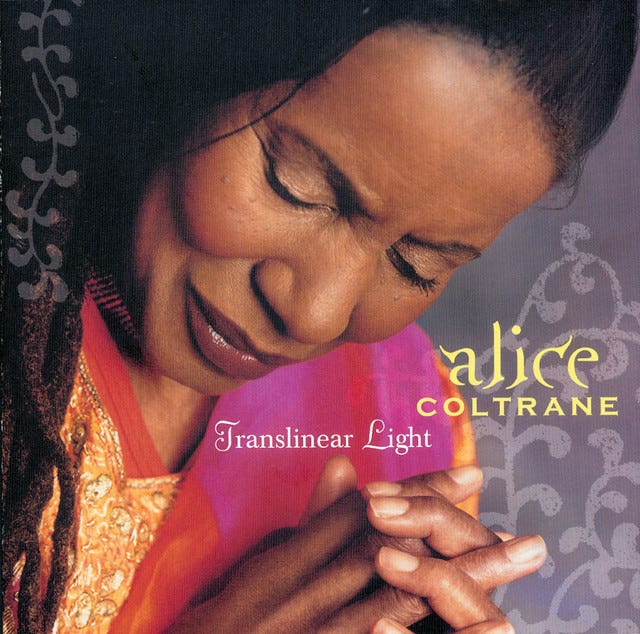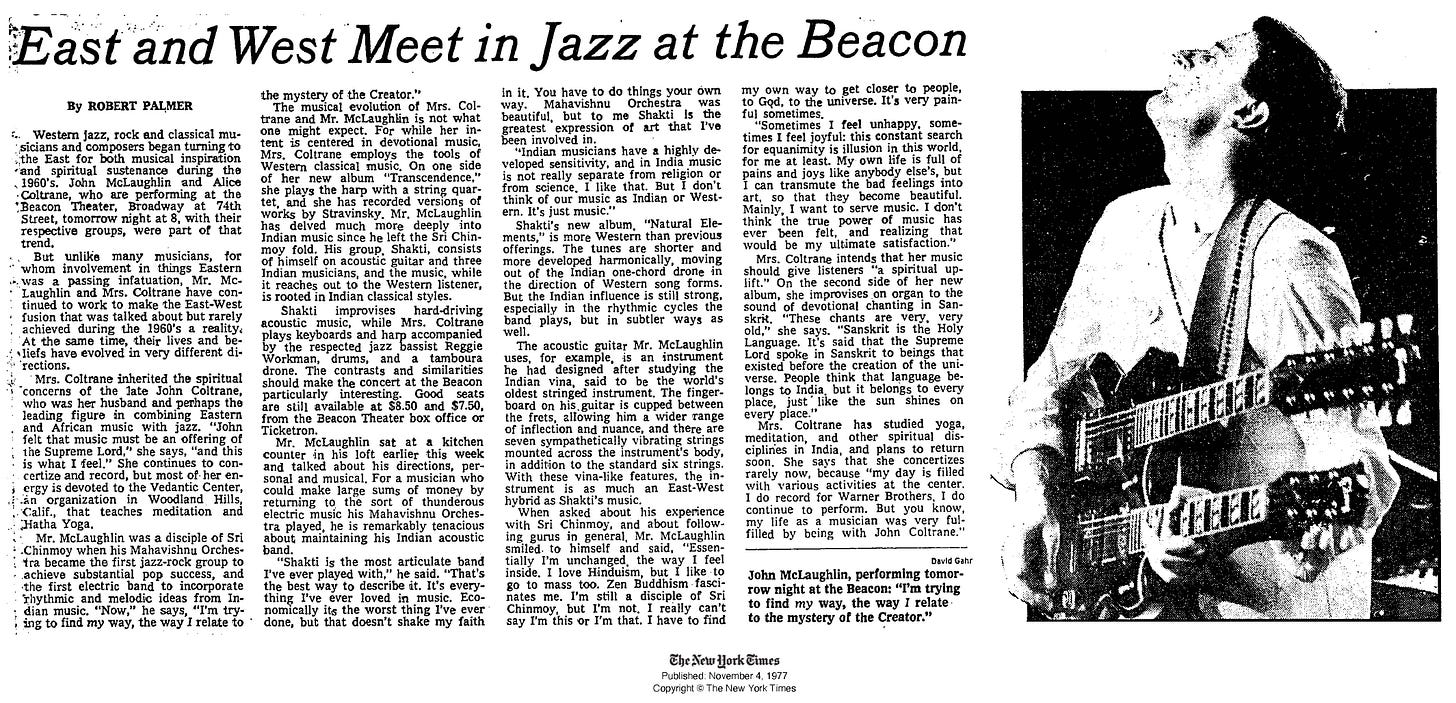Alice Coltrane's Translinear Light @ 20
Her final studio album came out September 28, 2004
Leo Records update! The next batch of digital reissues will be released on Bandcamp next Friday, October 4, and it will include a bunch of really interesting Anthony Braxton titles, like three 4CD sets of standards from 2003; four volumes of ninetet performances from 1997; and a trio concert with saxophonist Evan Parker and trombonist Paul Rutherford. We’ll also be putting up two classic titles from Cecil Taylor, and several by Parker’s trio with bassist Barry Guy and percussionist Paul Lytton, including two collaborations with pianist Marilyn Crispell and one where they join forces with pianist Alexander von Schlippenbach and drummer Paul Lovens to form an amazing one-off quintet. We’ll also have two albums led by legendary bassist Reggie Workman, an Art Ensemble of Chicago live release, and more. So bookmark leorecords.bandcamp.com and get ready!
Burning Ambulance Music update! We’ve got two new releases coming out next week: Ivo Perelman and Nate Wooley’s Polarity 3 and Tungu’s Irrational Thinking of the Subject. As always, they come in beautiful heavy duty gatefold mini-LP sleeves, so I recommend buying the physical versions, but either way you can pre-order both now at burningambulancemusic.bandcamp.com.
We’re also running a special deal — you can get all three volumes of the Perelman/Wooley Polarity series on CD for just $35, plus shipping. So consider that, for yourself or the avant-jazz fan in your life. Makes a great gift!
Book update! All journalists know it’s getting to be year-end list-making time, and I’m really hoping to see In the Brewing Luminous: The Life & Music of Cecil Taylor show up on some Best Music Books of 2024 lists. To that end, if you’re a journalist who’d like to read it, email me for a PDF! If you want to buy it, it’s available from Amazon, from AbeBooks, and direct from the publisher.
I profiled Detroit saxophonist Mike Monford for DownBeat (ignore the byline that says Ken Micallef wrote it). Here’s the link.
Finally, my latest Ugly Beauty column for Stereogum is up. It includes an interview with saxophonist Nubya Garcia (her new album Odyssey is excellent), and reviews of 10 other records, including a fantastic archival live album by the Black Artists Group. Here’s the link.
Alice Coltrane has pretty much been declared a saint at this point. Over the last dozen years or so, her catalog has been re-assessed, compiled, and expanded multiple times, and many young artists, including harpist Brandee Younger, have cited her 1970s work as highly influential on the current wave of “spiritual jazz”.
The most notable releases are the 2017 Luaka Bop compilation The Ecstatic Music Of Alice Coltrane Turiyasangitananda, which gathered tracks from three of her devotional releases (Divine Songs, Infinite Chants and Glorious Chants); 2018’s Spiritual Eternal: The Complete Warner Bros. Studio Recordings, a 2CD set on Real Gone Music bundling Eternity, Rada-Krsna Nama Sankirtana, and Transcendence; Kirtan: Turiya Sings, a 2021 release of her 1982 devotional tape Turiya Sings minus the original’s synth and string overdubs; and this year’s The Carnegie Hall Concert, an astonishing 2CD live set recorded in 1972.
(The aforementioned devotional releases fetch triple-digit prices on Discogs these days, by the way. I own Divine Songs and Infinite Chants on CD; maybe I should let them go?)
But this is all posthumous rehabilitation. Alice Coltrane died in 2007, and at that time, she was mostly regarded as a minor figure. Her run of Impulse! albums from the late ’60s and early ’70s were out of print in the US (though they’d been reissued on CD in Japan). Part of this was certainly her own doing; she retired from the music industry in the late ’70s to run an ashram in California; the devotional releases mentioned above were sold only to spiritual followers and those who heard about them and sought them out.
When she was alive, Coltrane’s music was generally dismissed. Some members of the jazz community reacted with fury when she released 1972’s Infinity, an album of previously unissued John Coltrane material with added strings and additional bass playing from Charlie Haden. In his 1995 book Ocean of Sound, David Toop writes, “Jazz buffs regard these sweetened tracks with the same revulsion aimed at Yoko Ono by Beatles fans: the integrity of masculine art screwed up by a woman.”
And when she wasn’t criticized, she was simply ignored. I searched the New York Times archive — which I had found to be an incredibly valuable resource for writing about Cecil Taylor when researching In the Brewing Luminous — and found not one album or concert review from the period when Coltrane was most active. You might think the paper would have sent John S. Wilson, their jazz critic at the time, to the 1972 Carnegie Hall concert mentioned above, but nope. It wasn’t until 1977, when she was largely retired from music, that Robert Palmer interviewed her and guitarist John McLaughlin in advance of a co-headlining concert at the Beacon Theatre.
The last Alice Coltrane album released in her lifetime was released 20 years ago this week, on September 28, 2004. Translinear Light was recorded across multiple sessions between April 2000 and June 2004, and produced by Ravi Coltrane, who also plays on it, as does his brother Oran. Charlie Haden plays on four of the album’s eleven tracks, with Jack DeJohnette on drums (DeJohnette also plays on the opening organ-drums duo, “Sita Ram”), while James Genus appears on three others, with Jeff “Tain” Watts behind the kit.
Translinear Light includes five Alice Coltrane compositions, including one, “Jagadishwar”, that she had previously recorded on 1982’s Turiya Sings. There are also versions of John Coltrane’s “Crescent” and “Leo”, both of which she had performed with him and afterward (there’s a stunning, nearly 40-minute “Leo” on her 1978 double live album Transcendence), and versions of traditional hymns and Hindu devotional songs. The new version of “Jagadishwar” is particularly beautiful, as Ravi Coltrane plays a sax solo where his mother’s vocals had previously been, and she unfurls lush clouds of stringlike synths as Genus and Watts turn it into a gentle jazz ballad.
The next track, a version of the spiritual “This Train” played on Wurlitzer electric piano, with Haden and DeJohnette backing her, is fascinatingly weird, and her reworking of “Blue Nile” with Genus and Watts (originally recorded on 1970’s Ptah, the El Daoud) is the kind of perfect, concise performance one dreams of getting from an artist late in their career. The version of John Coltrane’s “Crescent” feels somewhat restrained, but Ravi Coltrane is not the same type of player his father was, and that’s a good thing. The version of “Leo” is the most aggressive and “out” track on the record; DeJohnette is playing as hard throughout as Rashied Ali did with John Coltrane’s final band, and his soloing delivers waves of pure pulsing energy, bolstered by eerie organ drones.
Translinear Light is not a perfect album; like many records from the late ’90s and early ’00s, it suffers from “CD bloat”. Eleven tracks in 73 minutes is too many, even when an artist is “coming back” after more than two decades “away”. At the same time, I wish it had included even one track on which Alice Coltrane played the harp. But as a late-career statement — and it does feel like an intentional “final word”; she mentioned in interviews at the time, “I told my children I’m so happy to do this, but I’m not starting a second career!” and the final track, “Satya Sai Isha”, features a group of ashram singers accompanying her, as if she’s saying, “OK, that was fun, but now I’m going back to my real work” — it’s really good. It reminds us of what a unique space Alice Coltrane carved out for herself in the 1970s, making “spiritual jazz” that gave equal weight to both of those words.
Translinear Light is currently out of print on CD. (A 2021 Japanese reissue cut “Satya Sai Isha”, replacing it with a version of “Acknowledgement”, the first movement of John Coltrane’s A Love Supreme.) It’s available on streaming services, though, and definitely worth your time whether you’re a new or longtime Alice Coltrane fan.
That’s it for now. See you next week!




Thanks for featuring this. Translinear Light is so underrated. There's a little bit of filler but it's mostly good stuff. “This Train” is indeed a very strange track .....
Great piece. Alice Coltrane is indeed one of the most underrated artists in jazz. Check out Illuminations, another gem in her catalogue, with Carlos Santana.